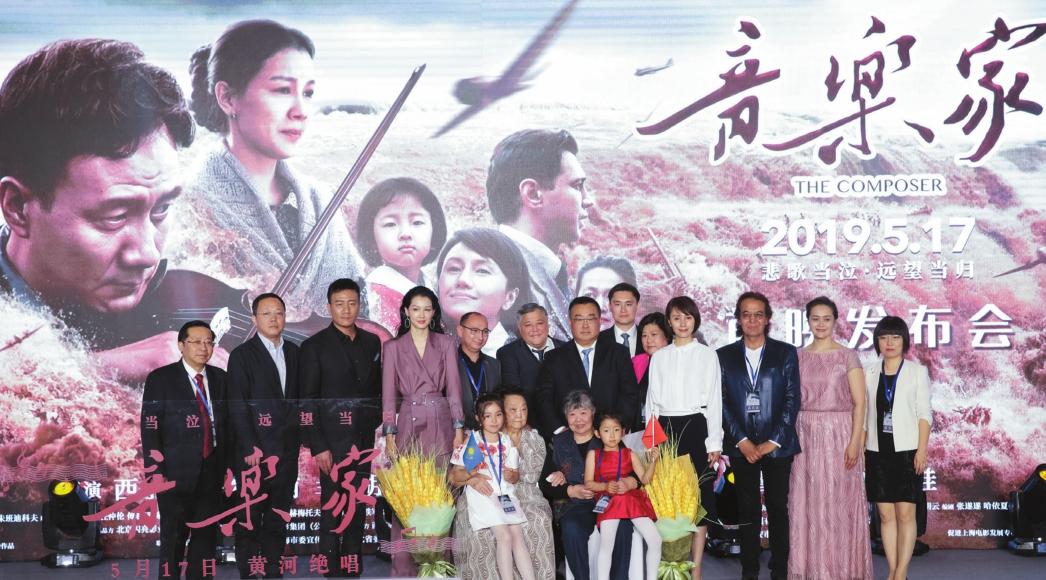A Note of Friendship
By Ji Jing
Seventy-four years after he died, Chinese composer Xian Xinghai is touching hearts again, this time through a film made on the tragic last years of his life that hit the screens in China and Kazakhstan in May.
Chinese director Xirzat Yahups biopic The Composer, the first China-Kazakh coproduction, shines a light on the man regarded as one of the greatest Chinese composers, who was forced by circumstances to spend his last years in Kazakhstan and Russia, where he took his last breath.
The director said he was inspired to make the fi lm by a speech made by Chinese President Xi Jinping at Nazarbayev University in the Kazakh capital in 2013. While mooting the idea of reviving ancient trade links to build a new Silk Road, Xi held up the story of the wandering composer, known as Huang Xun in Kazakhstan and Sinn Sing Hoi in Singapore and France, as an example of the ties formed along the route.
A Chinese composer in Almaty
Xian, best known for his Yellow River Cantata, a lyrical tale of the Chinese resistance to Japanese aggression (1931-45), started his story in Almaty after he was sent to Moscow in 1940 to compose the score for a documentary, Yanan and the Eighth Route Army. However, the work was disrupted when Germany invaded the Soviet Union one year later. Xian tried to return to China but was stranded in Kazakhstan, never able to get back home to reunite with his wife and daughter. In October 1945, he went to Moscow for medical treatment and died there, far from home.
Found in dire circumstances in Almaty, he was helped by Kazakh musician Bakhytzhan Baikadamov, who took him home in 1941 and invited the composer to stay with his sisters family.

“During the war (World War II), each adult was rationed only 300 grams of bread every day and for children it was 150 grams. My grandmother was amazed that my uncle brought Xian home. However, my uncle said he would arrange for Xian to live with us,” Kalamkas Arislanova, niece of Baikadamov, told China Central Television in a recent interview.
Arislanova was only 6 years old at that time. The octogenarian remembered how her mother made room for Xian to rest and work though their apartment was tiny.
Arislanovas father died on the frontlines during the war. Xian taught her to sing Chinese songs and in spite of the language barrier, became a father fi gure.
“Xian became part of my family. He could spend little time with his daughter, so he loved me as a daughter,” Arislanova told the media.“The love given to me by Xian is the most memorable part of my childhood… It makes me feel very warm every time I think of the days with him and I will remember this feeling all my life.”
Xian longed for his country and family. Arislanova said he would often say he hoped the war would end soon and there would be peace everywhere, in Moscow, Beijing and Almaty. He poured his longing for China, his anti-fascist passion and his hatred of the Japanese invaders into his works.
In Kazakhstan, he revised the Yellow River Cantata and created a number of other famous works. In 1944, he left Arislanovas family to become a conductor in Kustanay in north Kazakhstan where he created the symphony Amangeldy to commemorate Kazakh hero Amangeldy Imanov and support the Kazakh peoples fi ght against fascism.
In freezing Kustanay, where the temperature dove as low as minus 60 degrees Celsius in winter, the composer caught a cold which developed into severe pneumonia. Although he was sent to the Kremlin Hospital in Moscow, he died at the age of 40.
He had told Arislanovas family that if he died, he hoped they would find his wife and daughter and tell them about his yearning for them. Arislanova said she always remembered his instruction and tried to find his family, but it was not until 1989 that Xians daughter Xian Nina went to Almaty and met Arislanova.
In 1998, the street where Xian had lived was renamed after him and its parallel street was named after Baikadamov. Arislanova met Xian Nina again and the friendship begun by the older generation continued between them.
“Although I was only eight months old when my father left and I was never able to meet him again, I learned what kind of person he was through the papers and the letters he wrote,” Xian Nina said. “I miss him even more when I sing his songs.”
A resurrection
Xirzat said his fi lm crew spent two years shooting scenes during different seasons across three countries: China, Kazakhstan and Russia.
Famous Chinese actor Hu Jun plays Xian. Born into a family of musicians, with both his father and uncle singers, Hu learned to play the violin and piano as a child. These skills made it easier for him to play the composer.
Language was a big challenge while shooting the fi lm. Hu had to speak Russian, an unfamiliar language. Also, he knew little about Xians life before playing the role. “I didnt know that he had gone through so much misery in his last years until I read the script,” he said.
Kazakh actor Berik Aitzhanov, who plays Baikadamov in the fi lm, said he hopes to tell the story of Xian to every Kazakh so that the two countries friendship continues.
Producer Jonathan Shen was looking to make fi lms in collaboration with other countries participating in the Belt and Road Initiative when he heard about Xians story. He began to gather information about the composer and eventually went to Almaty to get more details.
The more he learned about Xians stay in Kazakhstan, the sadder he became to realize that though the composer is well known in China, his last years are hardly known. So he decided to make a film to show Chinese peoples appreciation to Kazakhstan for supporting this great composer and to demonstrate to the world the friendship between the two countries.
According to Shen, The Composer is just the beginning. His production company plans to collaborate with countries such as Russia, Indonesia and Iran to recount Chinas friendly exchanges with them on the silver screen.

